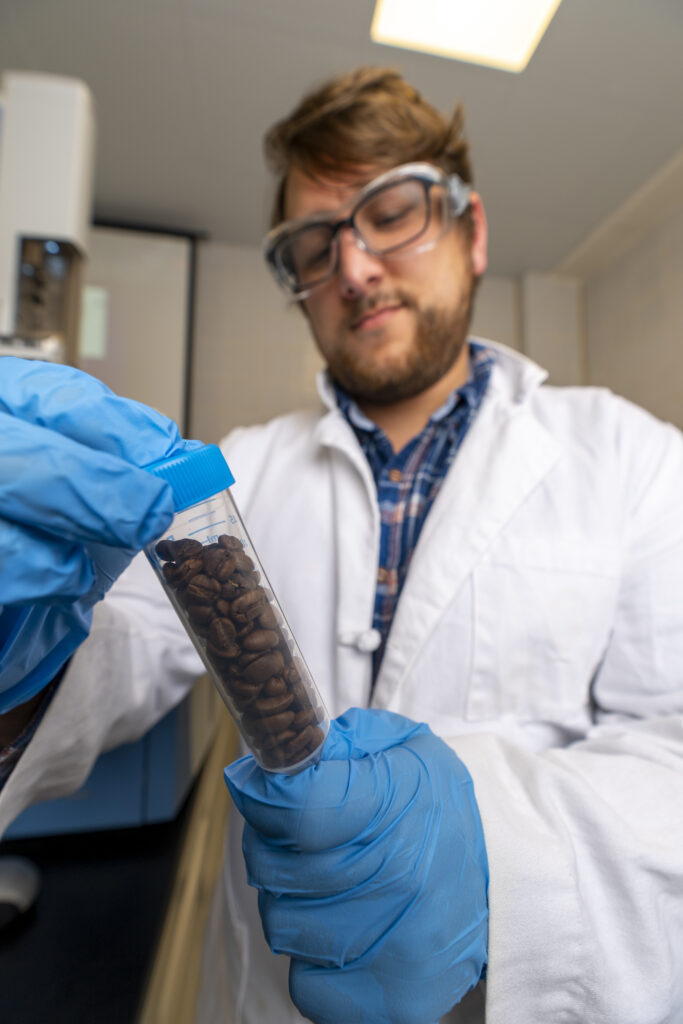Andrew Maust ’23 finds his true passion in food science
A Professor's Guidance Unlocks New Dimensions of Food Science Passion for Graduating Enthusiast, Andrew Maust

Although Andrew Maust ‘23 graduated with bachelor’s degree in political science from Rice University, it was a class called The Chemistry of Cooking that truly grabbed his attention and piqued his interest.
“The course was co-taught by a chef and an organic chemistry professor,” Maust said. “That class was my first introduction to food chemistry and food science. It was also where I learned you could have a career path in more than just food service or nutrition.”
After graduation, Maust spent several years working in the restaurant industry before deciding to return to college and dive deeper into the science of food. He recently earned his bachelor’s degree in food science and technology at Texas A&M. His plan is to begin a graduate program in the spring, studying food chemistry, flavor chemistry and new product development.
Maust said at the start of his food science journey, he did not see graduate school in his future, but “fell in love” with the undergraduate research he was conducting and became excited about continuing his food science journey.

“I am very thankful for Dr. Stephen Talcott,” he said. “As a food chemistry nerd, I really enjoyed his course on food chemistry. I was able to get to know and develop a mentor relationship with him and begin conducting undergraduate research. A few of the projects we worked on included mapping the volatile organic compounds responsible for the aroma and taste of whiskey and coffee.”
Maust as an undergraduate
Talcott said when Maust arrived at Texas A&M he was full of curiosity about food and full of career expectations — all centering around the world of food flavor chemistry.
“Taking on his challenge to pursue flavor chemistry, I began teaching him about food analysis and mass spectroscopy and, more specifically, gas chromatography — the tool of most flavor chemists,” said Talcott, a food chemist in the Department of Food Science and Technology. “These efforts were soon applied to a research project with a private company working with bourbon and understanding the flavor complexities associated with different ways to in-bottle finish a bourbon.”

Maust served as lead on the flavor chemistry section of this research, participated in training a sensory panel on bourbon flavor and is currently working as a co-author to publish the work. He has also been instrumental in working with the new high-acid, hot-fill food processing and bottling line in the National Center for Electron Beam Research.
Talcott added that just before starting graduate school, Maust led a process team to manufacture the first commercial run of the department’s signature Tailgate BBQ sauce.
“Andrew is a testament to perserverence in his education and an example for future students to follow thier passion in the vast field of food science,” he said
Maust’s student work and interests
While pursuing his degree, Maust spent time as a student production technician at the on-campus NASA Space Food Research Facility. He was also a student worker at the department’s Hot Fill/High-Acid Processing Line. Maust said this hands-on knowledge of food production techniques helped him secure competitive future internships with H-E-B and PepsiCo.
Maust said he also enjoyed the opportunities to engage and compete in the department’s food science-related activities.

“I’m a fairly competitive person and am proud to have been a member of both our IFTSA College Bowl and IFTSA and MARS Product Development Competition teams through the TAMU Food Science Club,” he said. “Last year, both groups competed in and were represented at national level competitions.”
Lessons learned and shared
Maust said his experiences as an undergraduate showed me him there was no substitute for learning by doing,

“My hands-on learning opportunities complemented and enhanced classroom learning by making concepts more tangible,” he said, “I would encourage all students to take advantage of the unique high-impact learning opportunities offered by Texas A&M.”
Maust added that he hopes more people will also discover food science and the many career opportunities it offers.

“Sometimes I feel like we’re one of the best kept secrets for career paths,” he said. “I would encourage others to go out and explore the field and find their passion. It’s a broad industry and I feel it truly has something for everyone, but you have to do the necessary work and find a niche where you can thrive.”